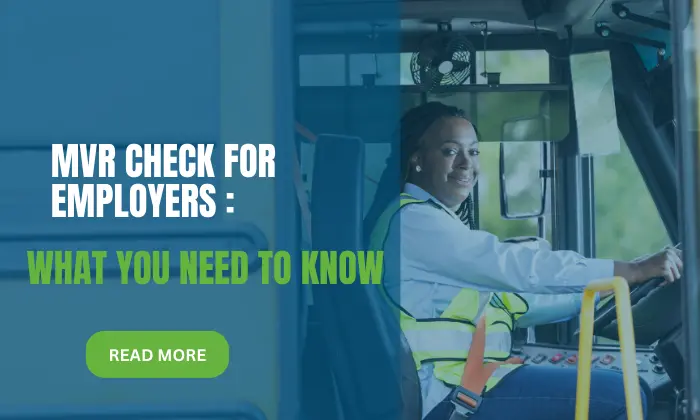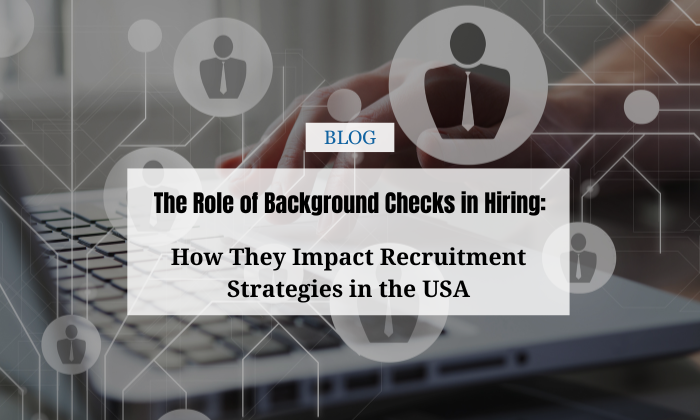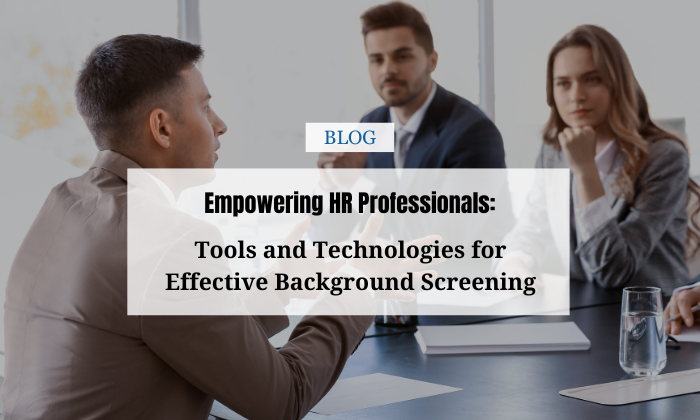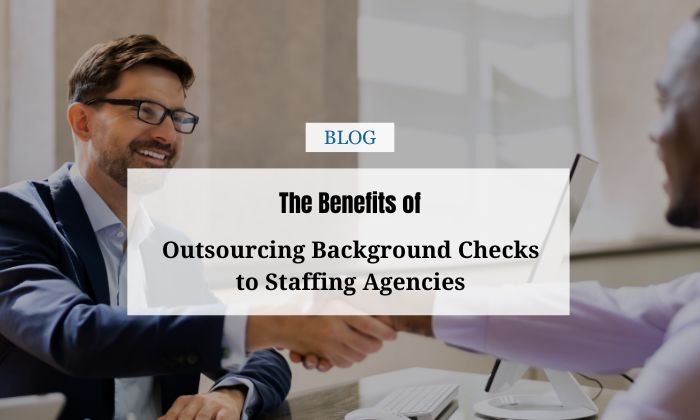Motor Vehicle Record MVR check for employers have become an essential tool for employers when it comes to ensuring the safety and reliability of their workforce. The primary purpose of MVR checks is to obtain an individual’s driving history, including any violations, accidents, license suspensions, or other relevant information. By conducting MVR checks, employers can gain valuable insights into an applicant’s driving record, helping them make informed hiring decisions.
These checks are particularly crucial for positions that require driving responsibilities or involve operating company vehicles. With MVR checks, employers can identify potential red flags and assess an applicant’s risk level, promoting a safer work environment and reducing the chances of accidents or liabilities. Implementing MVR checks as part of the pre-employment screening process demonstrates a commitment to safety and due diligence in hiring. By prioritizing MVR checks, employers can confidently select candidates with clean driving records, ensuring a reliable and responsible workforce.
Importance of MVR checks for employers
MVR checks hold significant importance for employers across various industries. Safety is a top priority in any workplace, especially when it involves driving responsibilities or operating company vehicles. By conducting MVR checks, employers gain crucial insights into an applicant’s driving history, allowing them to assess their risk level and make informed hiring decisions. These checks help identify any past traffic violations, accidents, license suspensions, or other red flags that may indicate a potential risk to the company and its employees.

By screening candidates’ driving records, employers can ensure they select individuals with clean driving histories, promoting a reliable and responsible workforce. Ultimately, MVR checks provide employers with the information they need to mitigate risks, protect their employees, and foster a culture of safety within their organization.
For example, when it comes to your child’s school bus driver, we want to guarantee a trustworthy and responsible individual behind the wheel. MVR checks provide peace of mind, assuring us that their driving history is clean and free from any concerning incidents.
Similarly, when an ambulance driver races against time to save lives, knowing their MVR check is clear assures us that they possess the necessary skills and a reliable track record to navigate swiftly and safely. Additionally, for the food delivery guy, a clean MVR check ensures that they prioritize road safety, reducing the risks associated with reckless driving.
MVR checks play a vital role in upholding safety and reliability standards in these crucial roles, allowing us to place our trust in these individuals with confidence.
Information obtained from an MVR check
An MVR check provides employers with valuable information about an individual’s driving history. This comprehensive report typically includes details such as license status, traffic violations, accidents, DUI convictions, license suspensions or revocations, and any other relevant driving-related information. It offers insights into an applicant’s behavior behind the wheel and their adherence to traffic laws. The MVR check helps employers assess an individual’s risk level and evaluate their ability to safely operate company vehicles or perform job duties that involve driving responsibilities.
Additionally, the report may provide details on license points or demerit systems, which can indicate a pattern of risky driving behavior. By obtaining this information, employers can make informed decisions during the hiring process and ensure they select candidates with clean driving records, promoting a safer work environment and reducing potential risks associated with negligent driving.
Legal Considerations and Compliance with privacy laws
Employers who choose to conduct Motor Vehicle Record (MVR) checks as part of their hiring process must navigate a range of legal considerations and privacy laws. It is crucial for employers to ensure compliance with these laws, which can vary from state to state. Seeking guidance from an attorney is highly recommended to ensure adherence to the applicable regulations.
One fundamental aspect is that employers must have a legitimate business reason for conducting an MVR check. This means that the information obtained should be directly relevant to the job duties associated with the position being filled. For instance, an employer seeking to hire a delivery driver would have a legitimate business reason to conduct an MVR check to verify the candidate’s clean driving record and assess their ability to perform the job safely.
Obtaining written consent from job applicants is another critical requirement. Employers must secure explicit permission before conducting an MVR check. The consent form should be clear, concise, and transparent, outlining the purpose of the check and how the collected information will be utilized.
Furthermore, employers must ensure compliance with the Fair Credit Reporting Act (FCRA) when conducting MVR checks. The FCRA, a federal law that governs the use of consumer reports, including credit reports, extends its provisions to MVR reports. Accordingly, employers are obliged to furnish job applicants with a copy of their MVR report and offer an opportunity to dispute any inaccuracies found within the report.
Benefits of MVR Checks for Employers
MVR checks empower employers to make informed hiring decisions, ensuring they select candidates with clean driving records and reducing the risk of accidents, liabilities, and potential legal issues. Listed below are the benefits of MVR checks for employers;
- Ensuring employee safety and reducing risk: MVR checks can help employers identify employees who are at risk of being involved in accidents. This can help employers to take steps to reduce the risk of accidents, such as providing additional training or assigning employees to different duties.
- Identifying potential red flags and assessing risk levels: MVR checks can help employers identify potential red flags, such as a history of traffic violations or accidents. This information can help employers to assess the risk level of an employee and make hiring decisions accordingly.
- Promoting a safe work environment: MVR checks can help employers to promote a safe work environment by ensuring that employees are safe drivers. This can help to reduce the risk of accidents and injuries, as well as lawsuits.
- Mitigating liabilities and insurance costs: MVR checks can help employers to mitigate liabilities and insurance costs. By identifying employees who are at risk of being involved in accidents, employers can take steps to reduce the risk of accidents and injuries. This can help to reduce the amount of money that employers pay in insurance premiums.
Best Practices for Conducting MVR Checks
Implementing best practices when conducting MVR checks is crucial for employers to ensure a fair and effective screening process. Here are some key considerations:
- Establishing consistent policies and procedures: Develop clear and consistent policies outlining when and how MVR checks will be conducted. Ensure that these policies are applied uniformly to all candidates to avoid any perception of bias or discrimination.
- Regularly reviewing and updating MVR check protocols: Stay up to date with relevant laws and regulations governing MVR checks in your jurisdiction. Periodically review and update your protocols to align with any changes, ensuring compliance and maintaining the highest standards.
- Adhering to fair hiring practices and avoiding discrimination: Use MVR checks as a tool to assess an applicant’s qualifications for a specific position, focusing on job-related factors. Avoid using MVR checks to discriminate against individuals based on protected characteristics such as race, gender, or disability, which may be unrelated to job requirements.
- Maintaining confidentiality and secure handling of MVR information: Treat MVR information with the utmost confidentiality. Implement appropriate data security measures to protect applicant data and ensure compliance with privacy laws. Only share relevant MVR information with authorized personnel involved in the hiring process.
By following these best practices, employers can conduct MVR checks in a fair, consistent, and legally compliant manner. This fosters trust, reduces the potential for legal complications, and helps ensure that qualified candidates with safe driving records are selected for positions involving driving responsibilities.
Navigating MVR Check Results
Navigating MVR check results is a crucial step for employers after conducting Motor Vehicle Record (MVR) checks on job applicants. Once the MVR reports are obtained, employers need to understand and interpret the information provided to make informed hiring decisions. It is important to review the results comprehensively, paying attention to details such as license status, traffic violations, accidents, and any other relevant driving-related information. Assessing the severity and frequency of violations or accidents can help determine the level of risk associated with a candidate’s driving history.
Employers should consider job-related factors and evaluate whether the disclosed information aligns with the requirements of the position being filled. In case of any concerns or discrepancies found in the MVR check results, employers should provide the candidate with an opportunity to provide additional explanation or clarification. It is essential to approach the process with fairness, ensuring that decisions are based on objective criteria and job-related factors. By effectively navigating MVR check results, employers can make informed choices, reduce potential risks, and prioritize safety in their hiring process.
Conclusion
In conclusion, Motor Vehicle Record (MVR) checks provide employers with valuable insights into an applicant’s driving history, enabling them to make informed hiring decisions and promote a safe work environment. By conducting MVR checks, employers can assess the risk level associated with candidates’ driving records, mitigate liabilities, and reduce the chances of accidents or legal issues.
It is crucial for employers to navigate the legal considerations and privacy laws surrounding MVR checks, ensuring compliance with relevant regulations. Implementing best practices, such as establishing consistent policies, obtaining written consent, and maintaining confidentiality, further strengthens the effectiveness and fairness of MVR checks. Ultimately, MVR checks serve as a vital screening tool that empowers employers to select qualified individuals with clean driving records, fostering a culture of safety and enhancing the overall success of their organizations.
How Securecheck360 can help?
Securecheck360 is a trusted partner when it comes to conducting Motor Vehicle Record (MVR) checks. These checks delve into state driving record’s information, drawing from the Department of Motor Vehicles (DMVs) in each respective state. With a minimum search period of three years, Securecheck360 ensures a comprehensive assessment of an applicant’s driving history. The MVR checks provide essential information such as license status, issue date, citations or violations, and even medical certificate details. It’s important to note that the availability and restrictions of MVR information may vary depending on the state.
With Securecheck360’s expertise and access to reliable data sources, employers can make informed hiring decisions based on accurate and up-to-date MVR information.
To know more about our services, book your free demo today!







